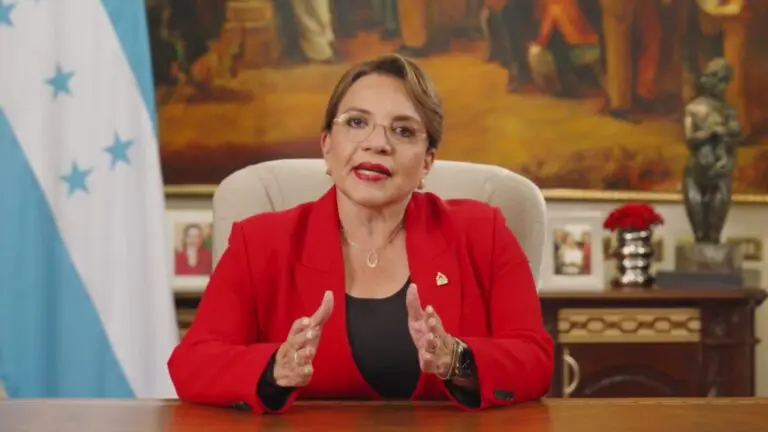
In her New Year's message, President Xiomara Castro highlighted advances in her government, denounced acts of interference by the United States, and greeted all those who confront a fierce struggle "against fascism on the continent."
Tegucigalpa, January 3 (RHC)-- In a nationwide radio and television broadcast, the President of Honduras, Xiomara Castro, addressed various topics this Wednesday, January 1, including the achievements of her government up to the beginning of her final year in office.
One of the highlighted messages was directed by the president towards the government of the United States, which announced that in 2025 the presence of the U.S. military base in Palmerola will be reconsidered if the new administration adopts hostile policies against Honduran migrants.
In reference to Washington's policies towards the region, the head of state stated: "For decades, they have maintained military bases on our territory without paying a cent, but they would lose all reason for existence if they adopt hostile measures against our citizens."
Soto Cano Air Base, located in Palmerola, Comayagua, has been a strategic point for U.S. Southern Command operations since its creation in 1982. Currently, it houses more than 500 military personnel and 500 American civilians, functioning as a central hub in the region.
Xiomara Castro emphasized that he expects a "constructive and friendly" dialogue with the new government of Donald Trump, but warned that a mass deportation of Honduran migrants, as promised by the elected president during his campaign, would be considered a hostile action.
The president also questioned the inclusion of magistrate Sonia Marlina Dubón in the Engel List and the suspension of her visa by the United States, calling it an "interventionist" act.
In this regard, Xiomara Castro announced that Honduras will file a formal protest with the U.S. government, stating that such measures undermine the country's sovereignty. In her speech, Castro reiterated her rejection of the Employment and Economic Development Zones (ZEDEs) project, which she described as a "betrayal of the homeland" and an example of neoliberal policies that undermine national interest.
In turn, as the pro tempore president of the Community of Latin American and Caribbean States (CELAC), Xiomara Castro highlighted her commitment to regional cooperation.
She announced that together with the President of Mexico, Claudia Sheinbaum, she will convene a meeting of foreign ministers to address the migration crisis and strengthen solidarity with countries like Haiti and Cuba.
In that context, she called on the United States government to invest in the interoceanic train project, an initiative that would connect the most important ports of the Caribbean and the Pacific.
According to Xiomara Castro, this project represents an opportunity to promote economic development in the region and strengthen bilateral cooperation.
The president took the opportunity to express her support for the people of Haiti, one of the countries most affected by instability and extreme poverty in the region. Although she did not specify concrete actions, Castro reiterated her commitment to addressing the Haitian situation within the framework of CELAC, emphasizing the need for a multilateral and solidarity-based approach.
In the assessment of her three years in office, Xiomara Castro highlighted achievements in areas such as energy, the economy, and social programs, despite what she called a "fierce struggle" against the political opposition and the media, which she claims are attempting to sabotage her administration's initiatives.
She denounced the legislative blockade of the Tax Justice Law by the bipartisan opposition, an act she described as a direct attack on the Honduran population.
"There is no initiative of ours that they do not try to block with all the means at their disposal," declared Castro, emphasizing her commitment to the "refoundation" of Honduras and her rejection of the return of neoliberal policies that, according to her, have forced the mass migration of Hondurans.
Likewise, the President of Honduras referred again to the "12 years and seven months of narco-dictatorship" to assert that, despite the consequences of past administrations, her mandate has achieved great accomplishments.
Likewise, the President of Honduras once again referred to the "12 years and seven months of narcodictatorship" to assert that, despite the consequences of past administrations, her term has achieved great accomplishments.
"With my Economic Cabinet, chaired by Finance, I implemented effective and timely policy measures to mitigate the impacts of the ruin in which I found the Honduran state," she assured. At the same time, she highlighted that, by the end of 2024, her administration achieved "notable economic improvements."
Finally, the Honduran president predicted greater growth for the year 2025 and emphasized that they expect the "economy to continue demonstrating a favorable evolution of 3.5% to 4%" for this year.

